- Home
- Thomas E. Sniegoski
Sleeper Code Page 14
Sleeper Code Read online
Page 14
“Tom, let us help you,” his father said calmly, moving toward him.
They still didn’t believe him. Their very lives were in danger and here they were, standing around, sad that their only child had lost his mind.
“Look! Tom screamed, pulling open the door again. ”Look for yourselves—I’m not crazy.”
The two men were closer now, guns drawn.
“We’ve got to do something!” He reached for his father’s cell phone, but his dad’s hand blocked his own.
“It’s okay, Tom,” his father said. “Everything is going to be fine.”
“But they’re coming.” Tom’s voice was growing higher with panic. “They have guns and…”
And then his father did the unthinkable—he raised a hand in greeting.
“What are you doing?” Tom asked incredulously, looking from his father back to the armed men in the driveway.
Burt and Crenshaw waved back, as if they were all old friends.
Tom couldn’t believe his eyes. “Dad, what are you doing?” he asked again.
His father remained silent.
“Mom, you have to do something,” Tom begged, trying to push past his father into the living room.
His father’s hand fell firmly on his shoulder, stopping him. “Tom,” he said. “Mom and I are going to help you.”
His mother stepped into the foyer. “Listen to your father,” she said with a strained smile. “This is for your own good.”
It was as if he’d been stabbed by the world’s biggest knife, the blade stuck deep within his gut, all his blood—his life—draining away and leaving him empty.
His parents—they were part of the madness too.
It would be so much easier to put his fate in the hands of someone else, to stop fighting, to give in, he thought.
So easy.
Tom tried to ignore the instincts that shrieked at him to run away and turned his attention to Burt and Crenshaw. He could see that Crenshaw’s nose was swollen, his nostrils stained with blood from where Tom had hit him in their struggle at the airfield.
“They’re going to kill me,” Tom warned, knowing in his gut that what he was saying was absolutely true. And then he caught sight of Madison running headlong across the lawn.
You know they’ll kill her too, don’t you? the voice of his double asked.
“Tom!” she called out, and at the sound of her voice the two men in the driveway began to turn, weapons aimed.
What’re you gonna do, boy? Garrett prodded. But Tom knew the answer before the question was even asked. He could never allow them to hurt her because of him.
It was a strange sensation then, as if his brain were expanding, filling up with things—as if a dam had been blown open, allowing a deluge of information to flood his consciousness, threatening to drown him.
He left the doorway just as the two men turned toward Madison. They were beside his mother’s car as he reached them. Crenshaw must have heard him coming, pivoting his body, nine-millimeter Beretta ready to fire. Tom saw the man’s movement as if in slow motion, considering a number of options as the weapon continued to its optimal firing position.
He was shocked by the things he seemed to know. There were at least thirteen ways he could remove the gun from Crenshaw’s hand; three even allowed the man to keep his life. Tom chose what he thought would be the quickest and least damaging, and suddenly he seemed to be moving at superspeed. He stepped forward, took hold of Crenshaw’s wrist, and, twisting the gun away, drove his elbow into the side of the gunman’s face. He plucked the gun from Crenshaw’s hand as he fell to the driveway unconscious and aimed it at Burt.
Not bad, an approving voice praised from somewhere inside his head.
Madison was standing perfectly still as Burt trained his own weapon on her. “Drop the gun or I’ll shoot her,” he croaked, and Tom could see that a fine sheen of sweat dappled the man’s brow and upper lip. He was afraid, and could you blame him? From what Tom knew about Tyler Garrett, he was certainly a person to be frightened of.
Tom started to smile, squinting down the barrel of the Beretta. “Go ahead, and then I’ll shoot you,” he said, startled by the cruelty of his statement.
His eyes locked with Madison’s and he felt his heart lurch. She was terrified, even more in the dark than he was. Then he heard the scuffle of feet on blacktop, and he turned to see his parents leaving the house.
“Tom, what are you doing?” his mother screeched.
It was the opportunity that Burt had been waiting for: as Tom turned back to the gunman, he saw that the van driver had changed his target from Madison to him.
Tom felt the hint of tension build in his trigger finger but resisted the urge to shoot. Instead he flipped the gun in his hand and threw it with incredible precision, hitting Burt squarely between the eyes. The man fell backward with a grunt, his gun firing once into the air as he fell to the ground.
Seeing that the man was down and out, Tom sprinted down the driveway to Madison.
“What the hell is happening?” she demanded as he grabbed her by the wrist, yanking her toward the driver’s side of his mother’s car.
“We have to get out of here,” he stated firmly, pulling open the door and forcing her inside. She didn’t fight, sliding across to the passenger side.
His parents yelled for him to stop, but he ignored them. They were somehow part of all this, and he couldn’t bear to listen to any more of their lies—to even look at them. He had to get out of here, pull his thoughts together.
“Please, tell me what’s going on,” Madison pleaded. “Are you in some kind of trouble? Who are those people? If you don’t start talking to me right away, I think I’m going to scream.”
He looked over at her, keeping his expression and tone as calm as possible. “As soon as we’re away from here, I’ll tell you everything I know, I swear.” He truly hated the fact that she had become involved, but there was nothing he could do about it now except try and keep her safe.
His father pounded on the hood of the car, causing him to jump, while his mother had approached the driver’s side and was rapping on the window glass, trying to get him to look at her. “Please, Tom, come out of there,” she begged.
He refused to look at her, turning his attention to the steering column.
“What are we going to do now?” Madison asked, her voice trembling.
“We get out of here fast,” Tom replied tightly.
“Do you have the keys?”
“Won’t need them.” With the flat of his hand he struck the plastic cylinder encircling the steering column, cracking it open to expose the multicolored wires beneath. Leaning to the left and gazing under the steering wheel, he found the two ignition wires. It was if he had somehow stepped back and was watching someone else detach and strip the two wires, tying them together. The engine rumbled to life.
Tom put the car in reverse, glancing momentarily at Madison, who was staring at him, mouth open.
“Where did you learn to do that?”
“Later,” he said as he stepped on the gas. “Besides, you wouldn’t believe me anyway.”
His mother and father leapt out of the way as the car shot down the slight incline.
“The van’s blocking our way,” Madison offered, quickly putting her seat belt on.
“Temporarily,” Tom answered coolly, feeling that same kind of emotional detachment he had felt while hot wiring the car.
Crenshaw was up now, blood dripping down his face from his re-injured nose. He had managed to retrieve Burt’s gun and stood at the side of the driveway, aiming at the Toyota. Tom turned the wheel slightly, forcing the man to dive out of the way. Then the back end of the Toyota struck the van at the end of the driveway with a crash, pushing it out into the street.
“Hold on,” he told Madison, putting the car in drive and pulling forward. His parents stood in the driveway, as if daring him to strike them. Tom suddenly saw the life he’d had with them flash before his eyes, feeling li
ke he’d just found out he was an unknowing participant in some kind of bizarre reality television show and this was the series finale.
It was all a lie.
His anger flared as if doused with gasoline, and he struggled with the idea of running them both down, but as much as part of him would have liked to, he simply did not have the time.
Tom hit the brakes, slammed the car in reverse again, and sent it barreling down the driveway into the van for a final time. His back end was practically nonexistent now, but he was able to maneuver around the obstruction. Throwing the car into drive and with tires screeching, he carried out their escape.
Tom reached the end of the cul-de-sac, banging a sharp right onto the main road. He could feel Madison staring at him. She was pressed up against the passenger door.
“We’re going someplace where we can talk,” he said quietly. “And I promise I can prove to you that I’m not crazy.”
Time stood still for Victoria in the driveway of her home. Calmly she took it all in, reviewing the events that had just occurred with crystal clarity.
It happened so fast.
There was a man on all fours just ahead, like a dog, blood streaming from a nasty gash on his forehead. Another man paced at the driveway’s end, talking on a cell phone, his voice raised excitedly. Victoria found his movement strangely mesmerizing: back and forth, back and forth.
She looked past the pacing man to the van now sideways across the width of the street in front of her house. That will need to be moved, she thought, making a mental note of the things that should be taken care of immediately.
She felt like one of the victims of a natural disaster that she’d seen so many times on the nightly news, women and men standing amid the wreckage of their homes, their eyes strangely vacant.
From this moment on, things will never be the same.
Out of the corner of her eye she saw that Mason had come to stand beside her. He was wearing that look as well, a glazed expression of shock. She had grown quite fond of her partner over time and reached out to take his hand.
“We’ll get through this,” she said quietly, giving his hand a gentle squeeze, hoping to infuse him with some of her strength.
He turned his attention away from the aftermath of their very own natural disaster to look at her. And for a moment she felt that he believed her, that they could handle the problem on their own. But then the look of hope drained away, replaced by one of trepidation as Mason released her hand and removed the cell phone from his belt.
“We have to make the call,” he said, his thumb already beginning to punch in the numbers.
Victoria wasn’t the least bit religious; how could she be, really, after all she had seen in her life, but for a moment she prayed for some kind of intervention, anything to buy them time to pool their thoughts and decide their next, best course of action. But her request to a higher power was denied, and she knew it would be pointless to ask her partner to delay the call. He had always been a stickler for protocol.
“Good morning, Mr. Kavanagh,” Mason Lovett said into the phone. “This is Handler One. We have a situation.”
An unfinished home in the Orchard Place
housing development proved to be exactly what they were looking for.
They had entered the abandoned construction site from an incomplete back entrance, on a rutted road of sand and dirt, hiding the Toyota inside the shell of a two-car garage and seeking shelter in the half-finished building to which it was attached.
Tom vaguely remembered hearing his parents talk about this development. The same guy had built the homes on Tom’s own cul-de-sac, but here the developer had bypassed certain environmental laws. He had already started building the multimillion-dollar homes when the state shut him down for infringing on the rights of an endangered species of bird that nested somewhere nearby. He had tried to fight the decision but had eventually gone bankrupt, leaving behind a partially developed site that would never see completion.
Inside one of these homes, in what would likely have been the master bedroom, Tom leaned back against the plasterboard wall and watched as Madison retreated to the far corner of the room.
“Nice place you’ve got here,” she said warily, stepping over a pile of trash probably left behind by some partiers. She was trying to make light of the situation, but the tremble in her voice gave it all away. She was scared.
“Yeah,” he responded, looking around the room. “A little paint on the walls and it’ll be good to go.”
She smiled briefly, then looked away. “So what now?” she asked, folding her arms tightly across her chest.
Tom slid down the wall to the unfinished floor, removed his glasses, and rubbed at his aching eyes. “I guess I need to tell you what’s going on … or at least what I think is going on, but I’m realizing how crazy it all sounds.”
Madison sat down as well but maintained a safe distance across from him. “Why don’t you let me be the judge of crazy?” she suggested. “What I’ve been through so far this morning has been pretty nuts, so I’m open to just about anything at this point.”
Tom leaned his head back against the wall, feeling the coolness of the plaster on his scalp. He was about to put his glasses back on but suddenly realized that he could see better without them. He folded them up and slipped them into his jacket pocket.
“Okay, here goes,” Tom said, taking a deep breath.
“You remember the other night, I was telling you about the bizarre dreams that people who have narcolepsy sometimes get?”
Madison nodded. “You called them hypnagogic hallucinations, right?”
If things weren’t so awful at the moment, he would have been psyched—she’d actually been listening to him. “That’s right,” he continued. “Well, a few nights ago I had this dream—this hallucination of an old man being murdered in a cabin.” He paused, not really wanting to go on but knowing he had no choice. “I killed the man.” He watched the expression on Madison’s face for signs of change. “But it wasn’t really me,” he added quickly.
He ran a hand through his hair and exhaled loudly. “This is where it gets a little confusing.”
Madison remained silent, waiting. Listening.
“I had another hallucination where I actually spoke to the old man, and he told me that it wasn’t a dream at all, that he was a … an implant, a kind of program put inside my head in case something happened to him. He said his name was Dr. Quentin—”
“Quentin?” Madison interrupted.
Tom nodded. “Bernard Quentin. The guy who first discovered Quentin’s narcolepsy; he was the old man in my dreams. Why?”
“Last night,” she explained. “I saw it on the news. He’s missing. He’d been at his cabin in Maine, but no one’s heard from him. Now you’re saying that you—”
“I’m connected,” Tom finished. What he had hoped was madness was gradually being exposed as reality. He felt like he was falling and wondered when he would hit the ground.
Madison stood up, eyeing him cautiously. “So you’re telling me that you killed this doctor … then talked to him after he was murdered?”
“Wait,” Tom begged. “I know it sounds like bullshit; I told you it would. I guess Quentin was involved in some kind of government project to create…” He hesitated.
Assassins, offered his other half.
“Assassins,” Tom finished. “He thought he was doing work to help cure Quentin’s narcolepsy, but in fact they were incorporating his research into a program where children with the disease had other personalities put inside their heads.” Tom slowly rubbed his temple with one of his hands.
“They wanted two separate personalities living inside one mind—the ultimate sleeper agent, a killer who wasn’t even aware that he was one. I guess those of us with Quentin’s narcolepsy are more susceptible or something.”
Madison was slowly sliding along the wall, trying to act casual as she moved toward the doorway. “So you’re some kind of government agent?”
/>
He caught the disbelief in her voice and really couldn’t blame her.
“No, I’m not,” he said, unable to keep the exasperation out of his own voice, desperate for her to understand. “It’s the other half of me—the one in my head. He’s the agent—the killer. Not me.”
Tom got to his feet as she darted toward the exit. “Please, Madison,” he begged. “Let me finish. Let me prove it.” She watched him from the doorway as he walked to the corner farthest from her and squatted. “Please,” he asked again, gesturing for her to come back into the room, and eventually she did, watching him with a cautious eye.
“I’ll stay right here,” she said, leaning against the wall by the door. “Unless the guy inside your head doesn’t approve.”
Tom tried again to make her understand, though he wasn’t quite sure that even he knew what was happening to him. “The message left by Quentin did something to the barriers inside my head. I know about my other personality now, and he knows about me.”
Madison laughed nervously. “Do you hear yourself? Do you actually expect me to buy what you’re trying to sell here?”
Tom said nothing, not wanting to sound crazier than he already did.
“The sad thing is that I think you actually believe this story,” Madison continued. “That all this stuff about government experiments and assassins is actually true, but tell me this, Tom Lovett, how do you know it’s not another one of your hallucinations? You yourself said it was hard to tell them from reality; how can you be sure it isn’t just some crazy dream?”
Tom reached down and snatched up a bottle cap, bouncing it in his hand. “I know,” he said simply.
“Prove it,” she replied.
Tom pointed to his face. “I don’t need my glasses anymore—because he doesn’t need glasses to see.”
She didn’t look convinced.
“And the car—I hot-wired a car, Madison.”
“Yeah, and how do I know you just didn’t learn that on the Inter—”

 Dark Exodus
Dark Exodus A Hundred Words for Hate rc-4
A Hundred Words for Hate rc-4 The Fallen
The Fallen Where Angels Fear to Tread rc-3
Where Angels Fear to Tread rc-3 Armageddon
Armageddon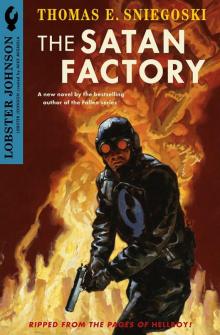 The Satan Factory
The Satan Factory In the House of the Wicked: A Remy Chandler Novel
In the House of the Wicked: A Remy Chandler Novel A Hundred Words for Hate
A Hundred Words for Hate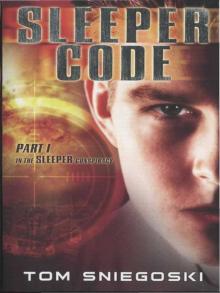 Sleeper Code
Sleeper Code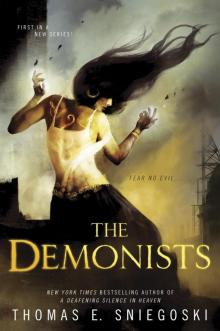 The Demonists
The Demonists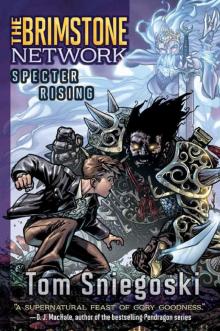 Specter Rising (Brimstone Network Trilogy)
Specter Rising (Brimstone Network Trilogy)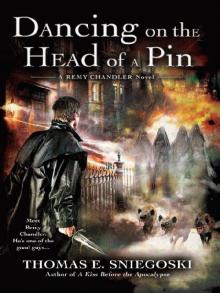 Dancing on the Head of a Pin
Dancing on the Head of a Pin The Shroud of A'Ranka (Brimstone Network Trilogy)
The Shroud of A'Ranka (Brimstone Network Trilogy)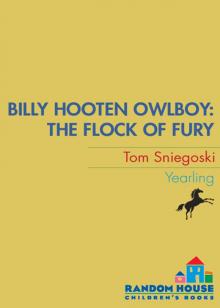 The Flock of Fury
The Flock of Fury Where Angels Fear to Tread
Where Angels Fear to Tread Leviathan
Leviathan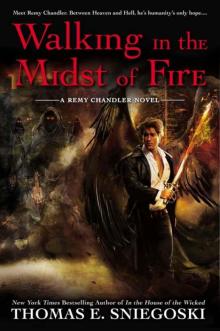 Walking In the Midst of Fire: A Remy Chandler Novel
Walking In the Midst of Fire: A Remy Chandler Novel Billy Hooten
Billy Hooten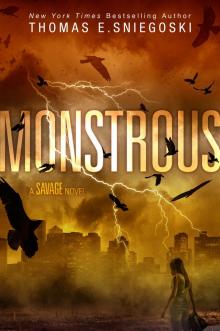 Monstrous
Monstrous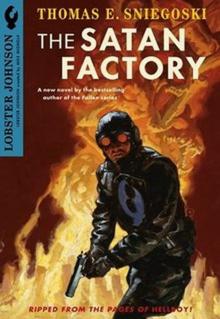 Lobster Johnson: The Satan Factory
Lobster Johnson: The Satan Factory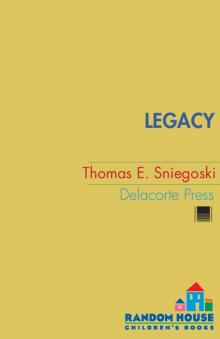 Legacy
Legacy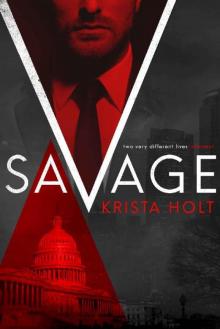 Savage
Savage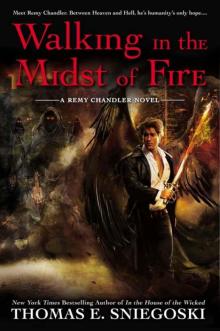 Walking In the Midst of Fire rc-6
Walking In the Midst of Fire rc-6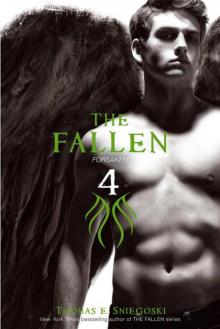 The Fallen 4
The Fallen 4 A Deafening Silence In Heaven
A Deafening Silence In Heaven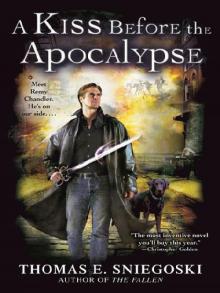 A Kiss Before the Apocalypse
A Kiss Before the Apocalypse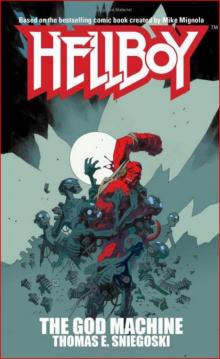 The God Machine
The God Machine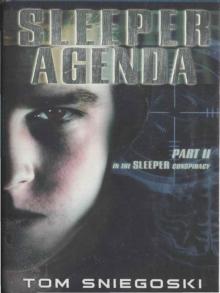 Sleeper Agenda
Sleeper Agenda The Girl with the Destructo Touch
The Girl with the Destructo Touch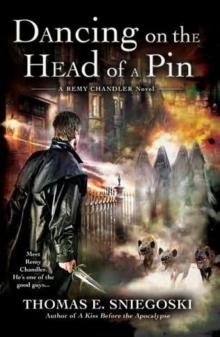 Dancing On the Head of a Pin rc-2
Dancing On the Head of a Pin rc-2 In the House of the Wicked rc-5
In the House of the Wicked rc-5 Reckoning f-4
Reckoning f-4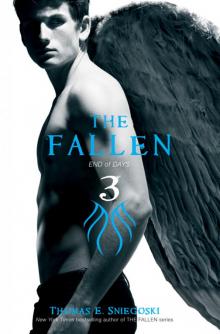 The Fallen 3
The Fallen 3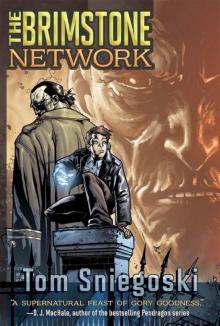 The Brimstone Network (Brimstone Network Trilogy)
The Brimstone Network (Brimstone Network Trilogy)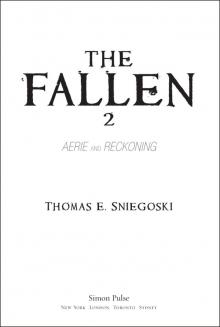 The Fallen 2
The Fallen 2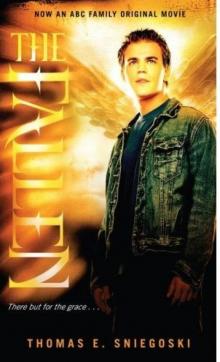 The Fallen f-1
The Fallen f-1